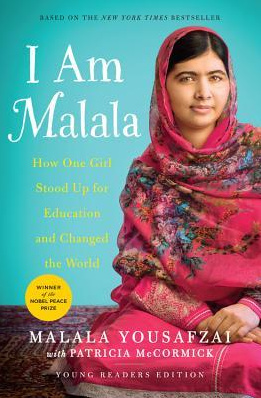

Malala Yousafzai · 240 pages
Rating: (12.6K votes)
“What a strange world it was when a girl who wanted to go to school had to defy militants with machine guns - as well as her own family.”
― Malala Yousafzai, quote from I Am Malala: How One Girl Stood Up for Education and Changed the World (Young Readers Edition)
“Perhaps that's because I do not remember a thing about the shooting. Not a single thing. The doctors and nurses offered complicated explanations for why I didn't recall the attack. They said the brain protects us from memories that are too painful to remember. Or, they said, my brain might have shut down as soon as I was injured. I love science, and I love nothing more than asking question upon question to figure out the way things work. But I don't need science to figure out why I don't remember the attack. I know why: God is kind to me.”
― Malala Yousafzai, quote from I Am Malala: How One Girl Stood Up for Education and Changed the World (Young Readers Edition)
“If you help someone in need you might also receive unexpected aid.”
― Malala Yousafzai, quote from I Am Malala: How One Girl Stood Up for Education and Changed the World (Young Readers Edition)
“I might have been calm, but my dear father was near tears. 'Are you all right, jani?' he said. 'Aba,' I said, trying to reassure him. 'Everybody knows they will die someday. No one can stop death. It doesn't matter if it comes from a Talib or from cancer.”
― Malala Yousafzai, quote from I Am Malala: How One Girl Stood Up for Education and Changed the World (Young Readers Edition)
“I would run to rejoin the children. Especially when it was time for the kite-flying contests- where the boys would skilfully try to cut down their competitors' kite strings. It plunges. It was beautiful, and also a bit melancholy for me to see the pretty kites sputter to the ground.
Maybe it was because I could see a future that would be cut down just like those kites- simply because I was a girl.”
― Malala Yousafzai, quote from I Am Malala: How One Girl Stood Up for Education and Changed the World (Young Readers Edition)

“As I watched my brothers run up to the roof to launch their kites, I wondered how free I could ever really be.”
― Malala Yousafzai, quote from I Am Malala: How One Girl Stood Up for Education and Changed the World (Young Readers Edition)
“I had grown up hearing the word terrorism, but I never really understood what it meant. Until now. Terrorism is different from war-where soldiers face one another in battle. Terrorism is fear all around you. It is going to sleep at night and not knowing what horrors the next day will bring.”
― Malala Yousafzai, quote from I Am Malala: How One Girl Stood Up for Education and Changed the World (Young Readers Edition)
“How dare you belittle me this way?'
'What the hell are you talking about?'
'I have never, not even once in my life, given my love to another man. And you throw it back in my face like a trifle.'
'You misunderstand me. It is because I value your love so highly that I do not accept it.'
'You don't accept it because you don't want to accept it. You're mired in misplaced guilt and self-pity.”
― Julia Quinn, quote from Dancing at Midnight
“But my foreknowledge must not encroach upon their free will. "In order not to impair human liberty, I will be ignorant of what I know, I will thicken upon my eyes the veils I have pierced, and in my blind clearsightedness I will let myself be surprised by what I have foreseen.”
― Anatole France, quote from Penguin Island
“I had never really thought of children as people, just as mysterious and needy creatures on their way to something greater.”
― Michelle Richmond, quote from The Year of Fog
“It's hard to watch. Can't stand the pressure of that much hope.”
― Lisa McMann, quote from Dead to You
“Honor has not to be won; it must only not be lost.”
― Arthur Schopenhauer, quote from The Wisdom of Life
BookQuoters is a community of passionate readers who enjoy sharing the most meaningful, memorable and interesting quotes from great books. As the world communicates more and more via texts, memes and sound bytes, short but profound quotes from books have become more relevant and important. For some of us a quote becomes a mantra, a goal or a philosophy by which we live. For all of us, quotes are a great way to remember a book and to carry with us the author’s best ideas.
We thoughtfully gather quotes from our favorite books, both classic and current, and choose the ones that are most thought-provoking. Each quote represents a book that is interesting, well written and has potential to enhance the reader’s life. We also accept submissions from our visitors and will select the quotes we feel are most appealing to the BookQuoters community.
Founded in 2023, BookQuoters has quickly become a large and vibrant community of people who share an affinity for books. Books are seen by some as a throwback to a previous world; conversely, gleaning the main ideas of a book via a quote or a quick summary is typical of the Information Age but is a habit disdained by some diehard readers. We feel that we have the best of both worlds at BookQuoters; we read books cover-to-cover but offer you some of the highlights. We hope you’ll join us.